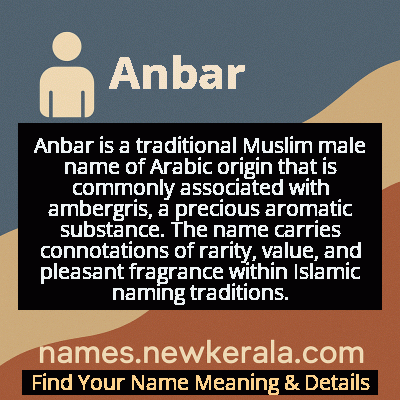Anbar Name Meaning & Details
Origin, Popularity, Numerology Analysis & Name Meaning of Anbar
Discover the origin, meaning, and cultural significance of the name ANBAR. Delve into its historical roots and explore the lasting impact it has had on communities and traditions.
Name
Anbar
Gender
Male
Origin
Muslim
Lucky Number
9
Meaning of the Name - Anbar
Anbar is a traditional Muslim male name of Arabic origin that is commonly associated with ambergris, a precious aromatic substance. The name carries connotations of rarity, value, and pleasant fragrance within Islamic naming traditions.
Anbar - Complete Numerology Analysis
Your Numerology Number
Based on Pythagorean Numerology System
Ruling Planet
Mars
Positive Nature
Generous, passionate, energetic, and humanitarian.
Negative Traits
Impulsive, impatient, moody, and can be overly emotional.
Lucky Colours
Red, maroon, scarlet.
Lucky Days
Tuesday.
Lucky Stones
Red coral, garnet.
Harmony Numbers
1, 2, 3, 6.
Best Suited Professions
Military, sports, philanthropy, leadership roles.
What People Like About You
Courage, energy, leadership, generosity.
Famous People Named Anbar
Anbar Shah
Military Commander
Prominent Mughal military leader known for his strategic campaigns in northern India
Anbar Al-Otaibi
Islamic Scholar
Renowned Saudi scholar and author of several influential works on Islamic jurisprudence
Anbar Hassan
Diplomat
Distinguished Pakistani diplomat serving as ambassador to multiple Middle Eastern countries
Anbar Khan
Business Leader
Influential Emirati entrepreneur and philanthropist in the energy sector
Name Variations & International Equivalents
Click on blue names to explore their detailed meanings. Gray names with will be available soon.
Cultural & Historical Significance
The cultural resonance of Anbar extends beyond its literal meaning to encompass broader Islamic values. The name evokes images of the historic Silk Road trade routes where ambergris was a valuable commodity, symbolizing the interconnectedness of Muslim civilizations. In many traditional Muslim families, naming a child Anbar expresses hope for the child to develop rare qualities and make valuable contributions to their community. The name also carries geographical significance through its connection to the Iraqi province of Al-Anbar, which has been an important center of Islamic learning and culture for centuries, further cementing its place in Muslim cultural consciousness.
Extended Personality Analysis
Individuals named Anbar are often perceived as possessing a rare combination of strength and subtlety, much like the precious substance ambergris after which the name is associated. They typically exhibit natural leadership qualities, demonstrating both resilience in challenging situations and diplomatic finesse in social interactions. Anbars are frequently described as having a magnetic personality that draws people toward them, combined with a thoughtful, introspective nature that allows for deep connections with others. Their character often balances traditional values with modern adaptability, making them respected figures in both family and professional settings.
In personal relationships, Anbars tend to be loyal and protective, often taking on the role of peacemakers or advisors within their social circles. They typically possess strong intuition and emotional intelligence, enabling them to navigate complex social dynamics with grace. Professionally, many Anbars excel in fields requiring both analytical thinking and interpersonal skills, such as business, diplomacy, or community leadership. Their inherent dignity and calm demeanor often make them natural centers of authority, while their genuine interest in others' wellbeing fosters lasting relationships and professional networks. The name's historical connections to trade and cultural exchange seem to manifest in many Anbars' ability to bridge different perspectives and find common ground in diverse situations.
Modern Usage & Popularity
In contemporary times, Anbar maintains steady usage across Muslim communities worldwide, particularly in Arab countries, Pakistan, and among diaspora communities in Europe and North America. While not among the most popular names, it enjoys consistent moderate usage, often chosen by parents seeking a traditional yet distinctive name with deep cultural roots. The name has seen a slight resurgence in recent years as part of a broader trend toward reviving classical Arabic names. In modern contexts, Anbar is perceived as both traditional and sophisticated, appealing to families who value historical significance without being overly common. Its usage spans various socioeconomic backgrounds and remains particularly strong in conservative Muslim families who prioritize names with Islamic heritage, while also attracting modern parents who appreciate its unique sound and meaningful cultural associations.
Symbolic & Spiritual Meanings
Symbolically, Anbar represents rarity, value, and transformation - drawing directly from its association with ambergris, a substance that begins as a waste product but transforms into one of the world's most precious fragrances. This metaphorical journey symbolizes personal growth, resilience, and the hidden potential within every individual. The name also carries connotations of purity and preservation, as ambergris was historically used to create lasting perfumes and medicines. In Islamic spiritual contexts, the name evokes the idea of inner beauty and moral fragrance - qualities that are highly valued in Muslim ethical traditions. The symbolic meaning extends to represent enduring value that becomes more apparent over time, much like how ambergris develops its distinctive aroma through years of ocean exposure and transformation.

